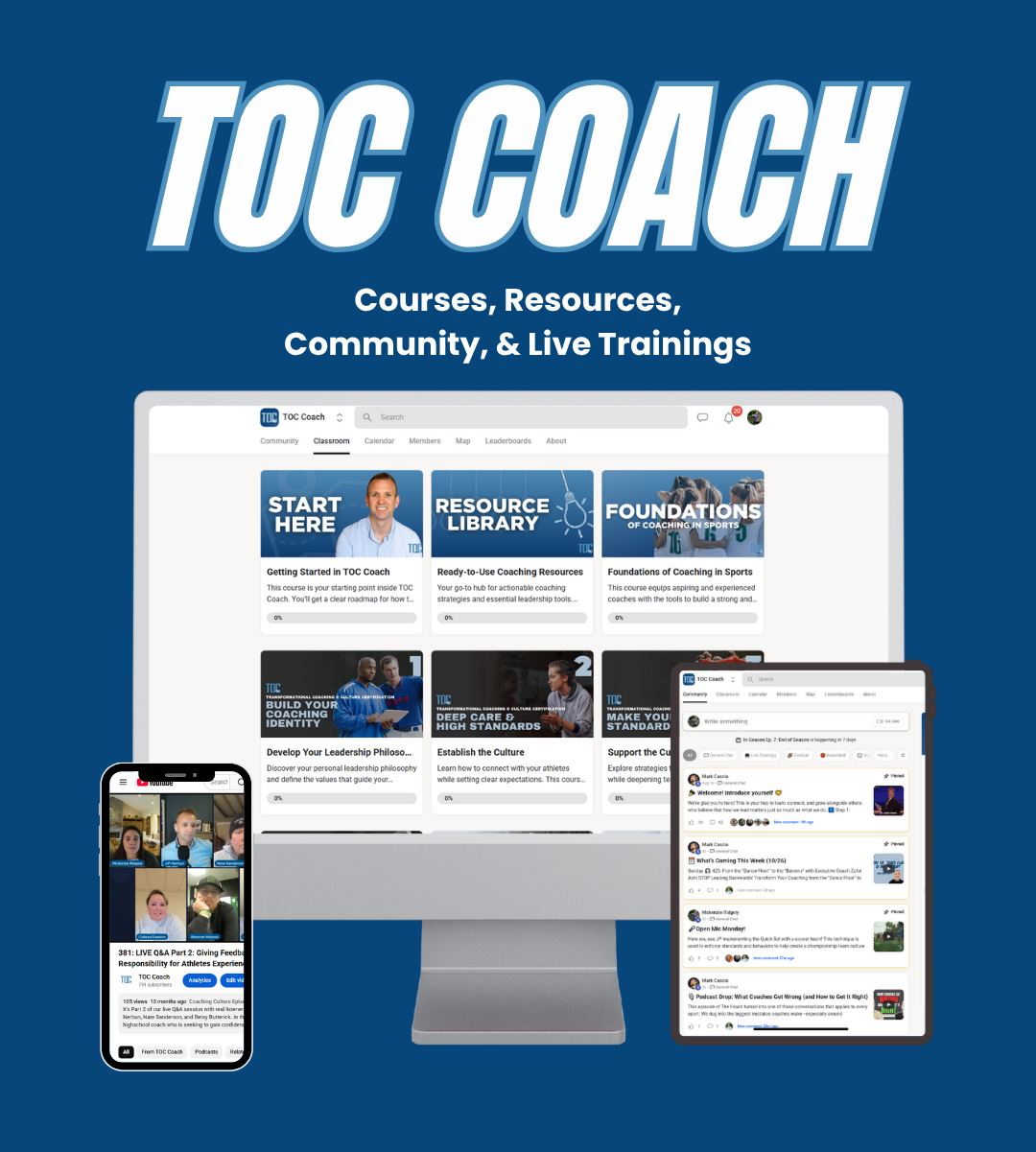No More Bad Practices: Establishing Excellence with the Quick-Set

Listen to this article on Spotify!
How to Never Have a Bad Practice: The Quick-Set
Every coach has experienced those practices where, within just a few minutes, you realize it’s going to be a rough day. No matter how much you encourage, urge, or even beg your team, their effort, focus, or attitude remains poor. By the end of practice, you’re left questioning whether anyone improved at all—you feel like you’ve wasted the last hour of your life. In these moments, it’s easy to blame the players. But remember:
- You get what you tolerate.
- What you permit, you promote.
- If you see something below standard and do nothing, then you’ve set a new standard.
In those first few minutes of practice, you (the coach) set the standard, not the athletes. So, how can you establish the right standard in the first five minutes? I call it the quick-set.
The quick-set is done before practices and games. While it ideally takes around five minutes, it can take longer when behaviors do not meet the standard you want for the practice. I’ve implemented the quick-set with basketball, volleyball, ice hockey, soccer, field hockey, and Gaelic football teams. Here’s a step-by-step guide to implementing a quick-set with your team, along with two examples from a college basketball team and a youth Gaelic football team:
1. Select 3-5 Simple Drills for the Quick-Set
College Basketball Team (Each drill lasts 60 seconds):
- 4-Corner Passing (60s)
- 2-Line Finishes (60s)
- 3-Man Full-Court Lay-Ups (60s)
- 2v1 Pitch or Finish (60s)
- Zero Shooting with Partner (60s)
Under-9 Gaelic Football Team:
- 8-Line Sprint Hand Pass (Right 30s, Left 30s)
- 8-Line Kick Pass (Right 30s, Left 30s)
- Popcorn Passing, 4 Balls (60s)
2. Teach the Drills and Transitions
Teach your team the drills and how to transition efficiently between them. Practice this regularly, as it may take a few sessions to get it right before your team is ready for introducing resets.
3. Define Excellence
Ask your team, "What would excellence look like in this drill?" Coach them to give specific behaviors. From their suggestions, choose 1-3 key behaviors that are most important for raising the team’s standard.
College Basketball Team:
- Call out names when passing the ball.
- Land on two feet in the paint for passes and finishes.
- Encourage teammates with high-fives as you return to the line.
Under-9 Gaelic Football Team:
- Call out names when passing the ball.
- Sprint to receive the ball.
- Pass with zip, no lobbing.
*Do not set outcome standards, such as making every shot or avoiding dropped passes.
4. Set Time or Rep Expectations
Ask, "How many minutes can every one of you be excellent?" They might suggest a wide range—anywhere from 2 to 60 minutes! Tell them you’re only asking for one minute of excellence per drill. You can adjust this expectation, for example:
- Time: 30 or 90 seconds
- Team Reps: 20 passes, shots, etc.
- Individual Reps: Everyone goes through the drill once.
5. Explain the Reset
Tell your team that coaches will be watching to ensure everyone meets the standard. If just one person drops below—by failing to call for the ball, not giving high-fives, etc.—the drill will reset to 0 seconds or reps. Let the team know it is up to them to support each other.
6. Observe and Reset
Step back and observe. The only thing coaches should call out is "reset." It’s on the players to encourage each other and ensure everyone stays at the standard. If you call a reset, it signals that someone isn’t following through on the required behaviors.
7. Coach Through Multiple Resets
You’ll likely get a reset within the first few seconds. And there will come a point where you get three resets in a row. When you have three resets in a row, huddle the team and ask, "What’s going on?" They first need to recognize the behavioral standards they’re failing to meet. A good question to ask is, "What should you do when you see a teammate not meeting the standard?" The answer is—remind them, call them up, or hold them accountable. Remind the team that you won’t move on to the next drill until they meet the standard.
8. Transition to the Next Drill
When they complete one drill, move on to the next! Tip: After a few practices where they consistently meet standards quickly, raise the standard again by setting expectations for quick transitions. If the team fails to transition quickly, reset them to the previous drill.
9. Handle Persistent Failures
If, after a lengthy time, your team still fails to meet the acceptable standards, one of two things must happen: either lower the standards or send them home. While rare, I’ve done one drill for as long as 25 minutes, and I’ve supported coaches who have had similar experiences. Likely, once a year, you’ll recognize the team just doesn’t have it that day, and you’ll send everyone home—they’ll be better off with the rest.
10. Continuously Raise Standards
As the season progresses, you can tweak drills occasionally, but this is more about raising standards. Here are some ways to continuously raise standards:
- Identify new behavior standards. Ask your team, "What can we do to raise the standard in this drill?"
- Set standards for transitions and reset them to the previous drill if they fail to meet them.
- Challenge your leadership group to be the “resetters” or have them run the quick-set without you watching.
Note for Games
As a coach, you might need to modify your drills to fit the space allotted to you, but I encourage you to run this as much like practice as possible. The team needs to complete their quick-set before moving on to other warm-up drills.
Why Is This So Powerful?
- You don’t waste practices operating below the standard.
- It mentally prepares your team to compete in practices and games—this is as much mental as it is physical.
- It teaches them that practice is a privilege—an opportunity to get better. If they aren’t going to work hard, support their teammates, and stay focused, they lose that opportunity.
- It teaches them how to hold each other accountable. Players will tire of these drills and start challenging their teammates when they aren’t meeting the standard, so they can move on to the next part of practice.
- Players will take pride in completing a quick-set without a single reset.
- Players will start to believe in the importance of the routine. They’ll reset the drill when it’s not going right, and they’ll start fixing it themselves, allowing you to step back and let them figure it out on their own.



